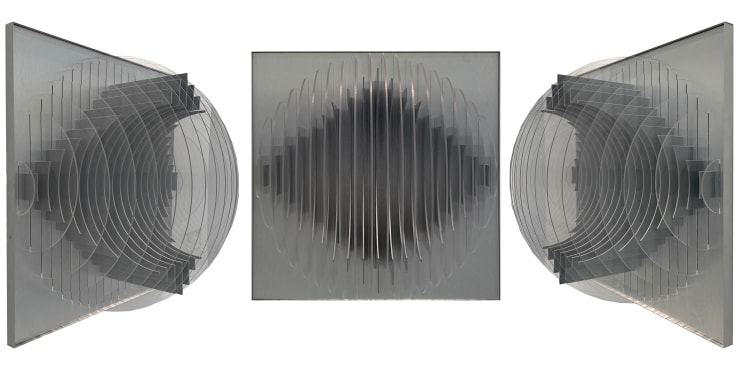J. Margulis
“I treat my three-dimensional pieces as light traps or secret blueprints, in which by controlling the placement of its components, I’m able to create intriguing 3-D containers, their designs are then fully revealed by applying or pouring light into them. In a sense, light becomes the ink that reveals the design by following a 3-D template.”
J.Margulis (Caracas, 1970) began his career as an artist through photography while studying Management in his native Venezuela. He worked in a family-run business exploring digital printing and later in life decided to apply his professional skills to art making, as he progressively became interested in sculpture. Today, his artwork is the result of an intrinsic connection between two and three -dimensional planes, working with sculpture in parallel with photography.
Margulis began producing acrylic 3D sculptures and compositions made from different types of colorful plastic sheets, affixing them onto surfaces, other times as free standing structures or traditional fixtures on a wall. As a direct consequence of these productions, he began photographing his pieces as a way of documenting them, thereby generating a significant volume of autonomous photographic work which created an intimate connection between the photograph and its related piece, developing a visual yet independent dialogue through language, photography and sculpture.
As most Venezuelan artists from his generation, Margulis came of age with the rise of Geometric abstractionism and Kinetic art, influenced early on by his encounters with the works of Venezuelan kinetic artist Jesús Soto and Naum Gabo, the Russian constructivist sculptor, specifically through his exposure to Gabo’s Linear Constructions in Space series, which challenge the construction of volume and space, creating figures with fine threads on a structure. For Margulis, abstraction is the language in which he expects magic to happen, an argot that he masters with ease, where space and its possible construction with the minimum use of materials become one of the playful strategies of his artistic expression. His colorfully sculpted elements emerge as models for his photographic creations, and conversely, each medium coexisting individually, yet dialoguing with the other, creating a variety of discourses based on different perceptions, in an infinite loop in which one agent of expression nurtures and enriches the other. Margulis’ effort has evolved to become a combination of sculpture and photography, creating visual compositions within two different languages and discourses that complement one another.
Margulis’ utmost concern is the creation of geometric shapes concieved mostly by changing the perspective of the viewer accompanied by the philosophical notion that everything in life has multiple levels of narrative, spatial perceptions, as well as varying degrees of empathy and diversity. Margulis sustains strong parallels between the human experience and the exposure to his works of art. Like life, his oeuvre entails a myriad of experiences that will move the viewer’s perception about reality.
Another important element in Margulis´work is the use of light and the translucency of color. He recognizes that the strong and dramatic use of bright and contrasting colors in his body of work stems from his years spent in Mexico and, of course, from his exposure to the tropical landscapes of Venezuela. He works with curved shapes, volumetric geometries, transparencies, intense colors filtered through light and plays with endless combinations in a continuum of colored layers, coupling these with photographs of his own work to create a complete cycle of a highly nuanced practice. Through a complex process, Margulis posits that the open threshold of humankind and the variety of paths that coexist in human society interact with one another to continually challenge our perception of life itself.




















